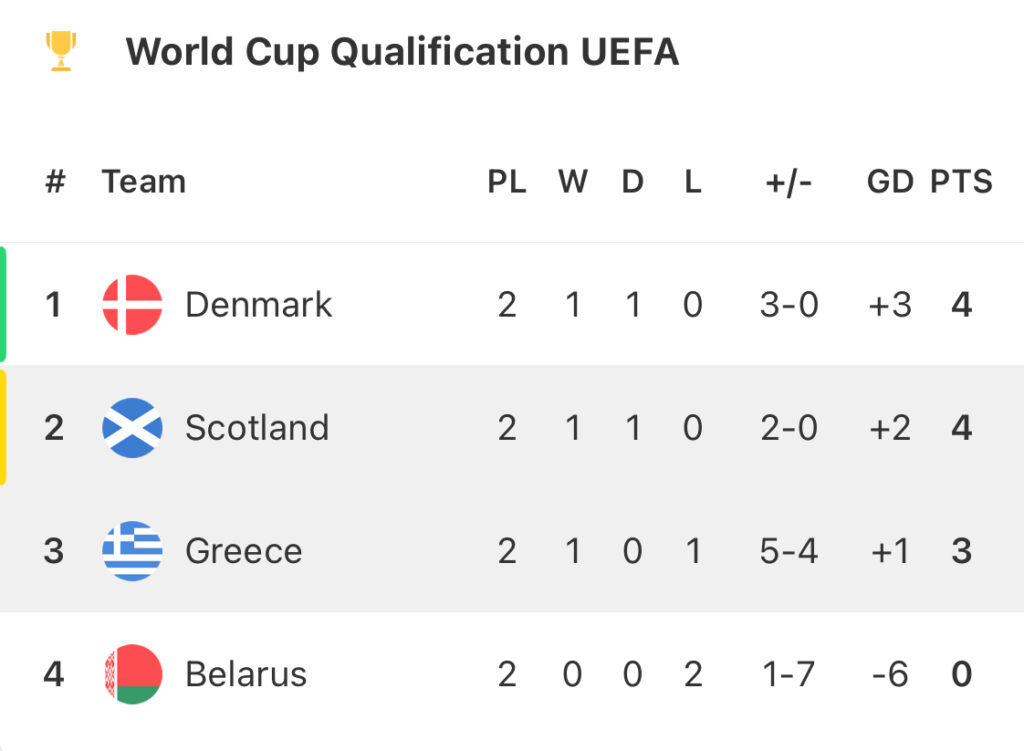The stakes are high as Steve Clarke dreams of a World Cup with Scotland
Scotland can take a big step towards World Cup qualification with a win over Greece at Hampden Park on Thursday.
Greece know what it’s like to silence the famous ‘Hampden Roar,’ as it has been dubbed through the decades. Indeed, it was only a few months ago that they beat Scotland on their own patch, securing their Nations League promotion at the expense of Steve Clarke’s side. The stakes will be even higher when the two teams meet again on Thursday.
In a four team group as competitive as the one Greece and Scotland have landed in, there is no room for a misstep. A defeat for either team would be catastrophic, especially for Greece who suffered a 3-0 loss at home to Denmark in their last outing. It would also be difficult to envisage Scotland finishing top should they lose on Thursday.

This is the sharpest of knife-edge matches Scotland have played in years, since their last World Cup qualifying campaign which ended with a disappointing defeat to Ukraine in the playoffs. Even if Scotland win on Thursday, the ‘Hampden Roar’ might be quietened by the sheer nervousness of the occasion.
The match could be a referendum on Clarke’s entire time as national team manager, certainly the latter part. While the 62-year-old succeeded in ending Scotland’s long wait for a major tournament appearance, qualifying for the last two Euros, the World Cup remains the golden carrot he has yet to bite.
Clarke must learn lessons from the way March’s defeat to Greece panned out. Scotland were picked off by a team with more urgency and energy in the attacking third. They afforded too much space to Konstantinos Karetsas, the teenage prodigy many believe is destined for the top of the sport. The same thing can’t happen again on Thursday.

At their best, Clarke’s Scotland have been difficult to beat and steadfast in their conviction to hit teams in quick transition. At their worst, they have been limited in their attacking ambition. This was certainly true of them at Euro 2024 when Clarke was heavily criticised for not taking the handbrake off with a place in the round of 16 at stake.
Many believed Scotland’s group stage exit in Germany should have marked the end of Clarke’s tenure. After five years in charge, it was argued that a new voice was needed in the dressing room. Still some believe this, although a respectable Nations League campaign stopped the spiral that looked to have started at the Euros.
Scotland have the quality to make it to a World Cup. In fact, their record of just one defeat in 16 qualifiers, a run dating back to 2016, makes it something of an anomaly that they haven’t already done so under Clarke. Scottish FA chief executive Ian Maxwell recently called World Cup qualification the “last piece of the jigsaw.”

In Scott McTominay, Scotland boast a player who finished 18th in this year’s Ballon d’Or voting. The Napoli midfielder finished Euro 2024 qualifying with seven goals and is most effective when he has the freedom to crash the box and cause chaos in the final third. Scotland need McTominay to be sharp against Greece.
They also need John McGinn to carry over the sort of form he has recently rediscovered at club level. The 30-year-old has scored three times in his last four Aston Villa appearances. It’s been a while since McGinn was truly influential for Scotland, but he could make the difference on Thursday night.
Ben Gannon-Doak could be the most important player in dark blue. The teenage winger gives Scotland a different dimension, a different route to goal. Clarke doesn’t have another player like Gannon-Doak, someone who can dribble past an opponent and create something out of nothing.
It will be on Billy Gilmour to control possession at the base of the midfield with Andy Robertson still an important and experienced figure at left back. On the right side of the defence, Aaron Hickey’s return from injury has given Scotland the sort of security on the ball they desperately missed at Euro 2024.
Against Greece in March, Scotland struggled in moments of defensive transition. Against Croatia and Portugal in the Nations League, though, they kept clean sheets in front of their own supporters. It’s this sort of defensive solidity Scotland require to top a group that includes Denmark, Greece and Belarus.
In many ways, Scotland have been building to this moment for years. They are accustomed to high stakes games having played at two major tournaments in the last four years. They possess their strongest talent pool in a generation or two. Key players are fit and rounding into form. Fail to beat Greece on Thursday, however, and it could all matter for little.
(Cover image from IMAGO)
You can follow every World Cup qualifier on FotMob in the build up to the 2026 finals – with in-depth stat coverage, including xG, shot maps, and player ratings. Download the free app here.